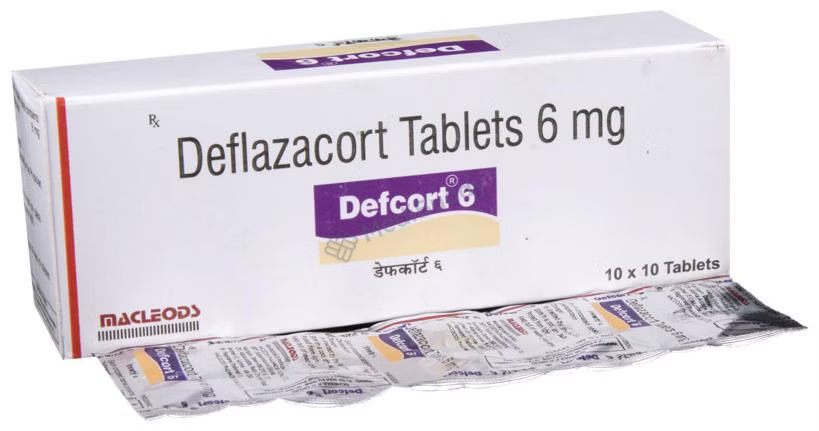Deflazacort is one of the most widely used corticosteroid medications around the world, especially in India, for treating inflammation, allergies, autoimmune disorders, and chronic swelling. Known for being a “safer steroid,” Deflazacort is preferred by many doctors because it offers the benefits of steroids with comparatively fewer side effects.
In this extensive guide, we cover Deflazacort tablet uses, benefits, dosage, side effects, precautions, interactions, long-term safety, and FAQs in a clear and medically accurate manner.
Table of Contents
1. What Is Deflazacort?
Deflazacort is a synthetic corticosteroid used to reduce inflammation, suppress the immune system, and treat allergic and autoimmune conditions.
It is similar to prednisolone but often preferred for children and long-term therapy because:
It causes less weight gain
It has less impact on bone strength
It is milder on immunity
It shows better tolerability
It is commonly available in strengths such as 6 mg, 18 mg, 30 mg, and 36 mg.
2. How Deflazacort Works
Deflazacort works by:
Reducing inflammation
It blocks inflammatory chemicals like prostaglandins and cytokines.
Suppressing the overactive immune system
Useful in allergies, autoimmune diseases, and asthma.
Reducing swelling
Helpful in skin diseases, joint pain, and nerve inflammation.
Acting as an immunomodulator
Balances immunity while avoiding extreme suppression.
3. Deflazacort Tablet Uses (Most Important Section)
Deflazacort is prescribed for more than 50+ conditions, but here are the major categories.
3.1 Anti-inflammatory Uses
Deflazacort is widely used to reduce inflammation in:
Rheumatoid arthritis
Osteoarthritis flare-ups
Bursitis
Tendonitis
Spondylitis
Gout attacks
Frozen shoulder
Rotator cuff inflammation
Lower back pain with swelling
Its effect is quick, usually visible within 3–48 hours.
3.2 Autoimmune Disease Treatment
Autoimmune disorders occur when the body mistakenly attacks its own tissues.
Deflazacort helps by calming the immune system.
Used in conditions like:
Autoimmune hepatitis
Multiple sclerosis (MS)
Autoimmune hemolytic anemia
Vasculitis
Psoriatic arthritis
Ankylosing spondylitis
Inflammatory bowel diseases (Crohn’s disease, ulcerative colitis)
3.3 Allergic Reaction Treatment
Deflazacort is extremely effective for:
Severe allergic reactions
Skin allergies
Drug-induced allergies
Hay fever
Hives (urticaria)
Allergic asthma
3.4 Dermatology Uses (Skin Disorders)
Deflazacort is used to treat:
Eczema
Psoriasis
Dermatitis
Atopic dermatitis
Seborrheic dermatitis
Vitiligo flare-ups
Lichen planus
Skin swelling and redness
It is commonly used along with antihistamines and topical creams.
3.5 Respiratory Conditions
Deflazacort helps reduce inflammation in:
Asthma
COPD flare-ups
Upper respiratory allergies
Nasal polyps
Sinusitis with severe swelling
3.6 Neurological Disorders
Doctors prescribe Deflazacort for:
Nerve inflammation (neuritis)
Bell’s palsy
Brain swelling
Spinal inflammation
Neuralgia
It provides relief by reducing pressure and inflammation in nerves.
3.7 Endocrine Disorders
Deflazacort may be used in:
Adrenal insufficiency
Congenital adrenal hyperplasia
Hormonal inflammation disorders
3.8 Eye Disorders
Used under strict supervision:
Optic neuritis
Uveitis
Iritis
Allergic conjunctivitis
3.9 Post-surgical and Injury Recovery
Deflazacort is used to:
Reduce surgical swelling
Treat inflammation after dental procedures
Manage swelling after orthopedic injuries
Reduce inflammation after trauma
3.10 Cancer Treatment Support
Used as part of supportive therapy:
To reduce inflammation during chemotherapy
To manage nausea
To reduce allergic reactions caused by cancer medicines
3.11 Duchenne Muscular Dystrophy (DMD)
One of the FDA-approved uses of Deflazacort is in children with DMD.
Benefits include:
Slower disease progression
Improved muscle strength
Better walking ability
Delayed wheelchair requirement
This is one of the most important therapeutic uses of Deflazacort.
4. Deflazacort Use in Children
Deflazacort is often preferred over prednisolone in pediatric cases because:
Less growth suppression
Lower risk of weight gain
Fewer long-term side effects
Used for:
Asthma
Skin allergies
Autoimmune conditions
Nephrotic syndrome
Juvenile arthritis
5. Deflazacort Dosage
Common strengths:
12 mg
18 mg
30 mg
36 mg
Typical Dosage Range
• Adults: 6 mg–48 mg per day
• Children: 0.25–1.5 mg/kg
Dosage depends on:
Age
Condition
Severity
Duration required
NEVER self-medicate steroids.
6. How to Take Deflazacort
Take after food
Take at the same time daily
Do not stop suddenly; tapering is required
Drink plenty of water
Avoid alcohol during medication
7. Side Effects
Common side effects:
Weight gain
Mild swelling
Headache
Nausea
Mood changes
Acne
Increased appetite
Serious side effects (rare):
High blood sugar
High blood pressure
Eye pressure increase (glaucoma)
Bone weakness
Stomach ulcers
Seek medical help if you experience severe reactions.
8. Precautions & Warnings
Avoid or use carefully if you have:
Hypertension
Active infections
Kidney issues
Heart disease
Eye disorders
Stomach ulcers
Thyroid disorders
9. Drug Interactions
Deflazacort interacts with:
Antifungals (ketoconazole)
Antibiotics
Anti-seizure medications
Blood thinners
Diabetes medications
Vaccines
10. Deflazacort vs Prednisolone
| Feature | Deflazacort | Prednisolone |
|---|---|---|
| Weight gain | Less | More |
| Bone loss | Lower | Higher |
| Potency | Slightly lower | Higher |
| Preferred in children | Yes | Sometimes |
| Long-term safety | Better | Moderate |
11. Effect on Immunity
Deflazacort lowers immunity slightly.
Avoid:
Large crowds
Unnecessary exposure to infections
Live vaccines
12. Long-Term Use
Long-term use requires:
Calcium supplements
Vitamin D
Regular doctor checkups
Eye pressure monitoring
Bone density tests
13. Who Should Not Take Deflazacort Tablet?
Not recommended for:
People with uncontrolled diabetes
Severe infections
Tuberculosis (active)
Active fungal infections
People recovering from surgery (unless advised)
14. Storage & Availability
Store at room temperature
Protect from moisture
Available in tablets and suspension
Prescription required
FAQs
1. Can Deflazacort be used daily?
Only if prescribed. Long-term use requires monitoring.
2. Is Deflazacort safe for children?
Yes, safer than other steroids but only under medical supervision.
3. Can I stop Deflazacort suddenly?
No. It must be tapered.
4. Is Deflazacort stronger than Prednisolone?
No, but it has fewer side effects.
5. Can pregnant women take Deflazacort Tablet?
Only if absolutely necessary and prescribed.
6. Does Deflazacort increase weight?
Yes, but less than other steroids.
7. Can I take alcohol with Deflazacort?
Not recommended — increases risk of stomach irritation.
8. Can diabetic patients take it?
With caution; it raises blood sugar.
9. Can Deflazacort cause hair fall?
Rarely; some patients experience mild hair thinning.
10. Can I take Deflazacort for fever?
No, it is not a fever medication.












